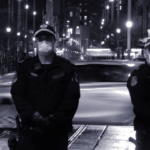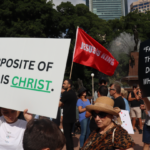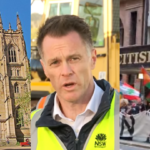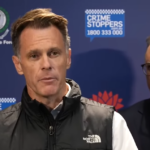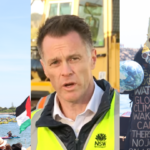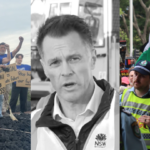Challenging the Power to Extinguish Protest Across Sydney: Interview with Palestine Action Group’s Josh Lees
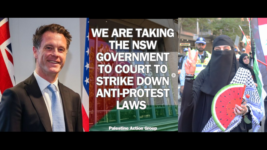
The Palestine Action Group launched a legal challenge against one of the new antiprotest laws that the Minns government rushed through New South Wales parliament as part of a package of bills in February 2025, which were said to be in response “to the recent instances of antisemitic behaviour” that had transpired in Greater Sydney over the previous three months.
The Crimes Amendment (Places of Worship) Bill 2025 saw a new criminal offence passed that can see a person charged with being near a place of worship and blocking access to it, facing up to 2 years imprisonment and/or a $22,000 fine, as well as a new power for NSW police to move on people protesting, demonstrating or parading near a place of worship, without authorisation.
These new laws are an extension of the 2022 NSW antiprotest regime, which involved the enactment of draconian penalties to prevent the obstruction of bridges, tunnels or major roads in Greater Sydney, Newcastle and Wollongong, as well as major facilities, which are laws that too carry up to 2 years prison time and a $22,000 fine, for many actions that used to minor crimes.
A coalition of civil society and legal groups have since been challenging the imposition of these laws, and this has included the Palestine Action Group, which is now stepping up in an attempt to see the new move on power revoked, and the other groups are in support of it.
Indeed, a move on order might sound rather trifle, but as PAG spokesperson Josh Lees tells it, the implications of these laws are dire.
Opposing a genocide
The Palestine Action Group has been hosting the weekly protests against the Israeli-perpetrated genocide against the Palestinians of Gaza, which now continues on into its 19th month. The Netanyahu government has been wantonly killing children, women and men using all conceivable means and starving the more than two million people confined within the slim strip of land.
Josh Lees has been one of key PAG organisers of the events. He and other stalwarts have been their week after week for more than a year and a half now, despite the oppressive impact the horrors of the mass slaughter are having upon all those bearing witness, and despite the massive opposition that the Minns government, the NSW police and even the PM has thrown them with.
The last time Lees and PAG took on the NSW state in respect of protests was when NSW police commissioner Karen Webb attempted to shut down the 52nd weekly protest in a row, and as they walked away from those proceedings triumphant, they’re now on the way back to the ring to take a second swing when the new proceedings commence on 19 June.
Sydney Criminal Lawyers spoke to Palestine Action Group spokesperson Josh Lees about the extensive implications the new places of worship antiprotest laws have for protest on Gadigal land in Sydney and right across NSW, along with the scandal surrounding the passing of the so-called antisemitic laws and the witch hunt that sees those opposing genocide classed as antisemites.
On 17 March, the Palestine Action Group filed a NSW Supreme Court legal action to challenge the additional antiprotest laws that the Minns government recently enacted.
Passed on 21 February, this legislation has created a prohibition on obstructing access to a place of worship, without an excuse, as well as a law to stop the harassment, intimidation and threatening of people trying to access a place of worship.
The bill has further empowered NSW police to move on demonstrators near a place of worship, which is, I believe, the part of the law you’ve focused on.
And these new laws measure mirror the 2022 antiprotest laws passed by the Perrottet government in terms of wording, their impact and the draconian penalties that apply.
So, Josh, why are you and PAG taking the Minns government to court over these specific laws?
These laws pose a real danger to our right to protest in NSW. In particular, the part of the law we’re challenging, because we think it is the strongest legal ground to challenge, is the extra power given to the police to move on anyone protesting near a place of worship.
That is of particular concern because it covers great swathes of all of our city, including all of our usual protest sites and historic protest sites, where large and famous protests have been held, such as at Hyde Park and Sydney Town Hall, which are in particular near places of worship – near churches.
The same goes throughout Sydney and throughout other cities in NSW.
So, if these laws are to stand it means we will constantly have these police powers hanging over us, whereby they can move protests on, and it means the power to shut down protests over huge parts of our city.
We view this as a real danger to our right to protest, and that’s why it’s not just us, the Palestine Action Group, that’s bringing the challenge, but it’s a whole coalition of organisations and rights groups, including the NSW Council for Civil Liberties and the Human Rights Law Centre.
The coalition also includes a range of other organisations, like groups wanting to protest against churches for various reasons, as well as climate activist groups, LGBTIQ groups, unions and other groups. They have all been part of this campaign and are supporting our challenge as well.
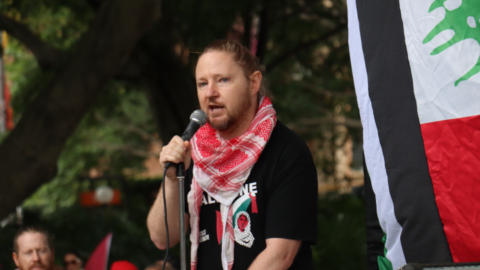
You’ve spoken at various rallies, as a representative of the Palestine Action Group, both at protests staged against the 2022 antiprotest laws and others focused on the recent measures prior to passing.
As I’ve seen you speaking at them, it’s occurred that the 2022 antiprotest laws don’t actually impinge upon the pro-Palestinian demonstrations PAG has been organising on Gadigal land in Sydney because those protests are organised by the book and have gained prior authorisation from police.
Indeed, the 2022 prohibition targeted unauthorised protests that obstruct bridges, tunnels, roads or major facilities.
So, how could these new places of worship laws you’re now challenging affect the rallies you’ve been regularly holding?
There are three key aspects to that. The first is that even when we seek to lodge a Form 1 with the police and we have a week’s notice to do that, which is the way that we can get around the laws in the Summary Offences Act in NSW, as it allows us to march on the streets, while blocking traffic and pedestrians, without police having the power to move on and shut down the protests.
So, even if we go down that road, as you said, for our big weekend protests, the police always have the power to challenge our Form 1s.
Now if these new laws are allowed to stand, it tips the scales in favour of police even more when it comes to the routine negotiations that go on around whether the police will accept our Form 1 as we have lodged them, or if they’ll seek to challenge and amend them.
That might seem slight, but if we have that risk hanging over us, if we fail to get the Form 1 through, in other words, if the police challenge it and we were to lose that challenge in the Supreme Court, then our protest could be banned altogether.
From time-to-time police try to amend our march routes to move through places that are more uninhabited in the city, and thanks to these new laws the risk of police wanting to pursue a more bullish stance has been raised.
So, that’s one thing, this strengthens the hand of police, even if we are going through the proper channels in getting a Form 1.
Secondly, there are lots of times when we don’t or can’t get a Form 1, which has happened to us, the Palestine Action Group, a number of times over the past 18 months.
One of the clearest examples of this is when we call snap rallies, in response to particular atrocities or massacres that Israel has carried out.
When we have done this on roughly a dozen times during the last 18 months – during the Rafa massacre or when Netanyahu and Trump openly announced their plans to ethically cleanse Gaza – we called these snap protests at Town Hall.
Now if you don’t have seven or eight days to lodge a Form 1, then basically you can’t get one. So, that is an instance when these new laws definitely will apply to lots of our protests.
Another occasion, a key moment, when we tried to hold a big vigil for the Palestinian victims of Israel’s genocide on October 7 last year, this, of course, was met with huge media and political furore, along the lines of ‘how dare you mourn Palestinian victims’.
So, the police planned to ban our protest on 6 October but also our vigil on the 7th. The way we responded was to say we would fight them in court around the protest on the 6th, but for the vigil, we asserted we did not need a Form 1, as we were only going to run a static event that wasn’t going to march anyway, and we just said, “Let’s go ahead without a Form 1.”
This is again an example where if they had the laws then, which they’ve enacted now, they could have actually used them to potentially ban that protest.
Finally, in terms of another extension to those 2022 laws that was also recently passed, which covers railway lines and stations, and again, this is an issue even for our protest in Sydney because we march across the light rail tracks, which you can’t avoid doing if you are protesting in Sydney these days, and yet, these laws apply to them.
So, again, there are a myriad of ways in which these laws being given to police are providing them with more power to shut down protests, and this is why they need to be defeated.
You’ve already been touching upon this, but PAG’s protests always take place in Hyde Park North and at Sydney Town Hall, so do you consider this could be reason to shut down a regular protest, not a snap rally, but one in which you have lodged the form and done everything by the books?
Exactly, yes. Hyde Park North is near Saint Mary’s Cathedral and also, another one, Saint James, and when we march through the city, we march past at least another half dozen churches, and Town Hall is next to Saint Andrew’s Cathedral.
There are so few places to protest in Sydney which are not near a place of worship, especially where there are people around, so to have those two protest locations potentially in jeopardy and many more potential protest locations, with this extra threat hanging over them, is terrible.
We’re not saying these laws are going to be used every time to prevent every protest, but what we are saying is that if police do have them in their back pockets, then we know they can use them when they deem it politically useful to do so, or there is a media campaign, or they get a tap on the shoulder from Chris Minns to prevent a protest, then that is exactly the time that they could be used.
Also, particular leaders from the places of worship, ones who might try and kick up a fuss and campaign to the police to shut down a protest, well, they could apply the law then.
That scenario could apply to us or to many other causes, where usually quite conservative religious leaders of these big churches do not support the causes we are protesting.
So, this gives police and potentially religious figures much greater powers to be able to ban protests.
Minns flagged the places of worship laws last December, however as the fallout from a series of so-called antisemitic arson and graffiti attacks that occurred across Greater Sydney from last November through to January, the premier combined the bill containing these protest laws with two other hate crime bills, and the laws were all passed as a package designed to combat the spate of crimes.
The AFP then revealed that the antisemitic attacks were a “fabricated terror plot” designed to make the government and police consider there was a wave of crimes being staged to convey a crisis in Jewish hate.
However, after this was revealed, the premier has refused any suggestions that the laws now be revoked, even though they were predicated upon false crimes. So, what do you think about Minns’ form here?
It’s a massive scandal, and it should be a much bigger scandal in the eyes of the media and the political establishment more broadly in NSW and right across Australia.
In my mind, there should be daily calls for Minns to resign over his behaviour on this front, and the levels of deception that went on week after week after week.
Minns had been told by the NSW police – if not by the AFP as well – but at least by the NSW police that they strongly suspected, if not outright knew for certain, by this point that these attacks had nothing to do with antisemitic sentiments in society for one and definitely had nothing to do with any protests.
Yet, Minns used the climate created by the hoax to ram through these antiprotest laws.
So, there’s absolutely no justification for these laws, but there wouldn’t have been anyway, because the politicians were never able to make any links between the protests and any of these kinds of attacks.
But now that the crimes have been confirmed a complete hoax, and weren’t even themselves motivated by antisemitism, that’s a scandal and the laws should absolutely be revoked. And more revelations are coming out in this parliamentary inquiry about how early they knew about this.
But we have to keep the pressure on Minns and this government to repeal these laws, and, as I said, the media share a lot of the blame here because it has largely moved on from this story and they’re not holding the government to account, which, unfortunately, is the same story we have witnessed with Israel’s genocide for the last 18 months.
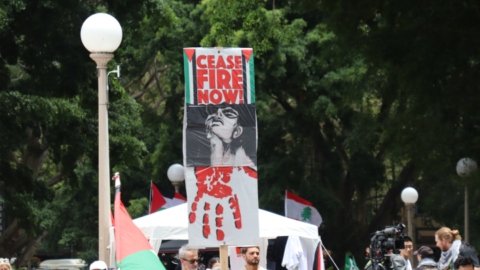
The antiprotest laws began being rolled out in response to climate defenders, who appeared to be the chief public enemy in 2022. Now, your Palestine advocacy group is challenging the new laws that affect it, at a time where the mantle of public enemy has been passed on to pro-Palestinians.
The antisemitism package of laws Minns passed based upon a criminal con job were said to have been enacted to prevent hate crimes against Jewish people.
However, since the Trump administration came to power, the US has been disappearing and deporting pro-Palestinian noncitizens on the pretext that their support for Palestine is antisemitic and proves they’re supporters of Hamas.
So, are you concerned that such extreme rights-eroding attacks on pro-Palestinians could occur here? And when looking at what has already occurred here, how far down that road would you say we already are?
I’d say we are pretty far down that road, and you only have to look at the kind of witch hunt that has gone on throughout our institutions, a whole swathe of institutions across Australia.
So, of course, the universities have been big sites of this, where dozens and dozens of students have faced disciplinary charges purely for their political activity, opinions and speech in support of Palestine.
The same has, of course, happened to staff members and academics, like Randa Abdel-Fattah, who is the Macquarie University academic who had research funding pulled or suspended at least for now.
We’ve also seen all kinds of slander and attacks on protesters. Right now, Melbourne activist Hash Tayeh is facing charges after being arrested over his chanting at protests.
This is incredibly outrageous, and the double standards make you want to yell and scream in anger about how blatant they are because, at the same time, the thing that we are all protesting against is a genocide.
We are protesting against the most blatant carrying out of war crimes, ethnic cleansing, mass killing and deliberate starvation, which has been documented blatantly in front of our eyes, and our government is doing nothing about that and is continuing to justify its support – even military support – of those crimes.
At the same time, many people in Australia have been cheering on Israel’s crimes and none of them are facing any charges around hate speech or anything like it.
There are all kinds of despicable racism and incitement incidents being directed against Palestinians, Arabs and Muslims every day, and none of those people are getting arrested or charged.
We know right now that there are dozens of people in Australia who have served with the Israeli Defence Forces, potentially in Gaza, none of whom, as far as we are aware, are facing investigation or arrest for potential breaches of war crime laws.
We have these outrageous claims of antisemitism being used to justify McCarthyite attacks on protest and dissent toward our government’s, the Israeli government’s, and the US government’s policies in the Middle East.
Lastly, you and PAG are well seasoned in facing NSW Supreme Court legal proceedings in respect of protests these days, as the NSW police commissioner took your group to court last October to try and shut down the 52nd weekly protest against the Gaza genocide, as well as a 7 October vigil to be staged by the group, and PAG triumphed.
Josh, I know it’s early days and the challenge does not go to court until June, but how are you and your lawyers considering the case at present? And what would you say is at stake here?
We obviously think we have a shot at defeating the laws, and we think this is important, because this is just one plank in the government’s overall apparatus of antiprotest laws and powers that they have amassed for themselves over recent decades.
This is a troubling one because, as we’ve said, they cover potentially so much of the city with these blanket antiprotest powers that the police could wield in lots of circumstances and it could massively restrict our rights to protest or to be able to call rallies at short notice, and even being denied Form 1s, which already happens quite often.
So, it’s important if we can defeat these laws, as this will put a dent in the wall of the antiprotest powers that they’ve got. It will strike a blow back and hopefully, put the government on the back foot and put pressure on them to repeal all of those latest laws.
But even if we do win, it’s not going to wind back all those antiprotest laws the state and the police now have in their back pockets.
So, this is by no means the end of the fight, and we have no illusions that a purely legal challenge can win back our right to protest.
Ultimately, our right to protest will only ever be won by and protected by people continuing to protest en masse and being prepared to defy these laws when necessary, and that is what we will continue to build for as well.


